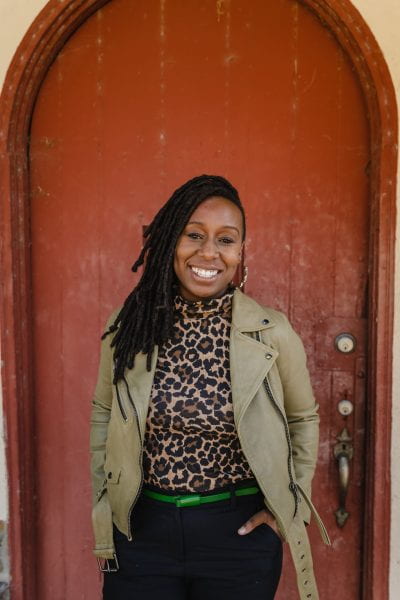Tiffani Marie Asks: How Are the Children?

On Oct. 27, the Lurie College will screen “The Children Could Fly,” a film co-produced by SJSU Assistant Professor of Teacher Education and Ethnic Studies Tiffani Marie with Hidden Temple Media. Photo courtesy of Tiffani Marie.
Among the many things one should know about San José State Assistant Professor of Teacher Education and Ethnic Studies Tiffani Marie: She is the lead singer in a band named after her great-grandmother Artelia Green, an Arkansas sharecropper whose independence startled a young Marie, but whose creativity and fearlessness remain an important influence on her today.
“When I became more conscious of and more lovingly aware of my ancestral practices, I learned that I can have a relationship with her [after her death],” says Marie. “I come from a really, really long line of educators. That’s a history that I was chosen into. I thought I chose to do this, but it was a history that I am perpetuating.”

SJSU Assistant Professor of Teacher Education and Ethnic Studies Tiffani Marie studies the physiological impact of schooling. Photo courtesy of Tiffani Marie.
That history comes to life in her classroom at SJSU, through her scholarly research at the Connie L. Lurie College of Education’s Institute of Regenerative Futures; in her music, through her podcast; and, most recently, in her documentary, “The Children Could Fly,” which she co-produced with Hidden Temple, a Sacramento-based media production company. The Lurie College will host a screening of the film, following a faculty research symposium that features Marie alongside Assistant Professor of Special Education Sudha Krishnan on Friday, Oct. 27.
Marie describes the film as “an amalgamation of my doctoral research, as well as my classroom practice.” During her 18 years as a public school educator in San Francisco, Marie observed that many of her high-achieving, honor-roll, college-bound students suffered from high levels of stress that contributed to significant health issues.
She embarked upon a four-year study in which she measured the relative growth or degeneration of telomeres, biomarkers that indicate signs of accelerated aging. The result? Many of the teenagers surveyed had telomere ratios comparable to women experiencing extreme stress who were decades older than them — in some cases, the stress level of 14-year-olds was equivalent to those of 60-year-old women.
“I wanted to interrogate what was happening [in our schools] from more of a public health, physiological perspective,” she says. “If it’s not about grades, if it’s not about success in schools, how do we gauge whether or not our young people are leading meaningful and deliberate lives?”
Marie discovered that by introducing culturally-responsive education and acquainting (or reacquainting) students with indigenous languages and practices, she and other educators could address the levels of stress that students experienced, and hopefully make a positive impact on their overall health and wellness. Her research took her to Puerto Rico, where she studied models of unschooling; to New Zealand, where she studied models of language acquisition and intergenerational education; and read the works of Malidoma Some and other critical West African scholars, to study West African ancestral practices.
By connecting students to their own histories and granting them access to cultural knowledge that Marie says for decades, if not centuries, has been denied Native and BIPOC communities, educators could facilitate both learning and healing. When culturally responsive approaches were incorporated in the classroom, the students showed increased engagement in their cultural practices, improved wellness scores in surveys and interviews. Marie discovered that these findings aligned with telomere growth, indicating improved health outcomes.
“My research differentiates schooling from education and sees them as two different things,” she says. “Schooling is largely responsible for perpetuating the health disparities that we’re seeing, whereas education is connected to and responsible for really powerful disruptive agents in disrupting the embodiment of toxic stress.”
“I am, because we are”
Marie explores these findings and others in the film, as well as in her work with the Institute of Regenerative Futures (IRF). She leads the IRF alongside SJSU Assistant Professors of Chicana and Chicano Studies Johnny Ramirez and Christine Vega and Kenjus Watson of American University, whose research parallels Marie’s desire to envision a more holistic, community-based and culturally-responsive approach to education.
The IRF was created as a means to “create infrastructure that prioritizes the intentionality of wellness,” Marie says. She explains the concept of “regenerative future” in terms of both education and science; referencing “the regeneration of cells, the regeneration of our communities, the regeneration of our memories around our ancestral medicines and practices.”
Their shared projects include the Community Responsive Collective (CRC), which has spearheaded a listening campaign on San José’s East Side; the Black Futures Lab (BFL), which is engaged in a Black Wellness Framework currently addressing racial and ethnic health disparities in an Oregon birth initiative; and The Unschooling Caucus (TUC), which rethinks “school” and is collecting data related to teacher wellness in the San Francisco Bay Area.
RSVP to attend the faculty research symposium and film screening on Oct. 27.




